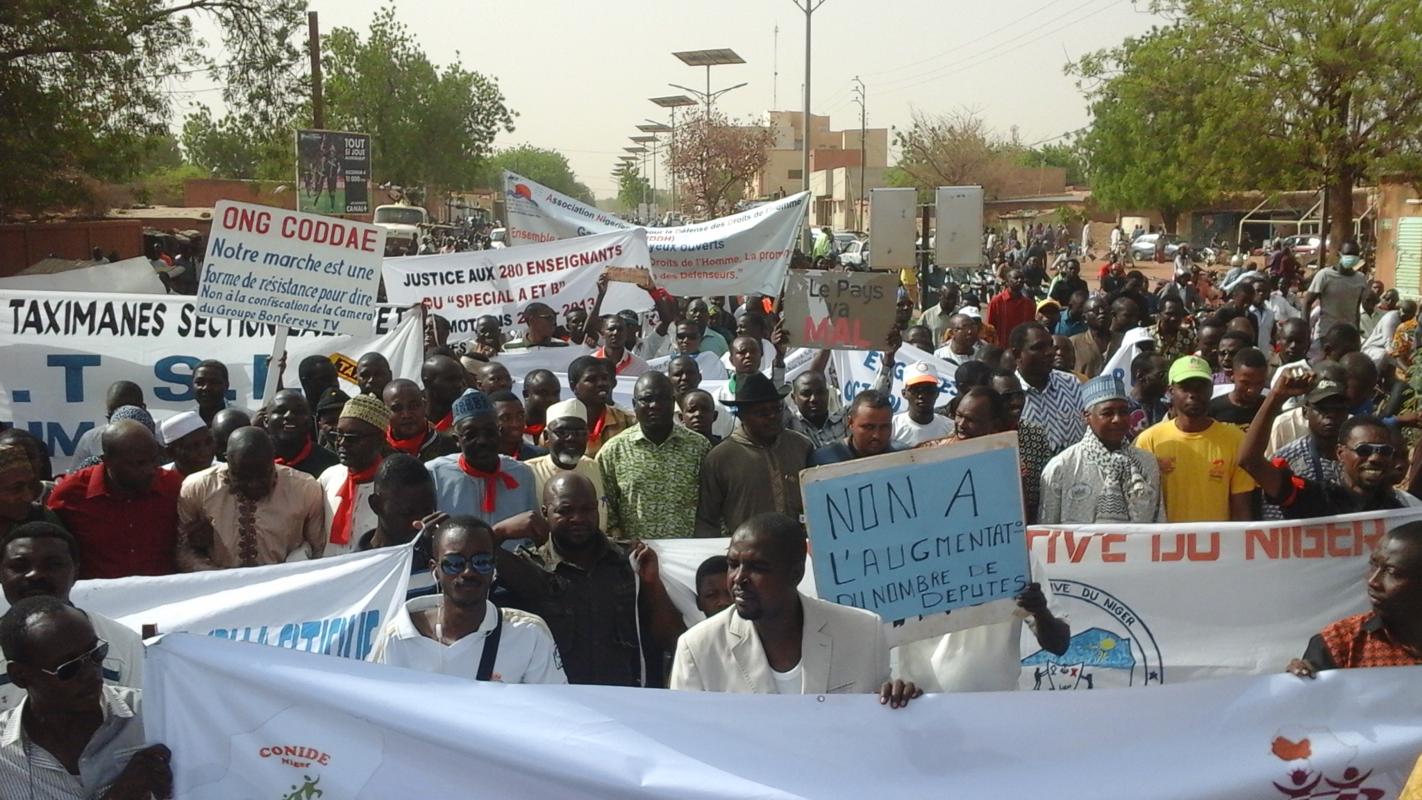On Saturday June 6, 2015, members of the Réseau des Organisations de la Société Civile pour la Transparence et l’Analyse Budgetaire (ROTAB), or Publish What You Pay Niger, and thousands of Nigerien citizens took to the streets of Niamey to express their dissatisfaction with recent developments in the country.
High prices at the pump and frequent and long electricity cuts already made life difficult for citizens of Niger but for ROTAB it was the arrests of two fellow civil society activists Moussa Tchangari from Alternative Espace Citoyen (AEC) and Nouhou Arzika from Mouvement pour une Citoyenneté Responsible (MPCR) that triggered a mass mobilisation. Moussa Tchangari and Nouhou Arzika had spoken out how the government has dealt with the Boko Haram crisis in the south of the country as well as on how it treats its loyal security forces. Both were subsequently arrested and released after only a week. These recent arrests were the latest in a wave of other arrests over last year, including the high profile detention of Ali Idrissa, PWYP Board member, and ten other fellow campaigners during the visit of French President Hollande last year at the height of the contract renegotiations with French nuclear giant AREVA.
“In fact we wonder if the contract actually exists or whether it was all a publicity stunt to satisfy the demands of civil society.”
Bad governance lies at the heart of the social crisis in Niger, a country that despite being the world’s fourth largest uranium producer lighting every third light bulb in France, is at the bottom of the Human Development Index (187 out of 187). One year after Hollande’s visit, the contract between AREVA and the Nigerien government still hasn’t been published, violating the 2010 constitution which dictates that contracts between companies and the government need to be published. In a joint press release by Oxfam France and ROTAB, Ali Idrissa stated that “one year after the contract was signed we still don’t know exactly what both parties have agreed to in Niger as we haven’t seen the contract. In fact we wonder if the contract actually exists or whether it was all a publicity stunt to satisfy the demands of civil society.”
Allegations of mismanagement at best and corruption at worst are also brewing in a conflict between SOPAMIN, the state-owned mine company of Niger, and Societe des Mines du Liptako (SML), a private company, for the management of the Samira Hill gold mine, near the border with Burkina Faso. The new director of SML, Abdelkader Cisse, had requested an audit with the Minister of Mines as good practice and to serve as a baseline for future benchmarking, but to his surprise, the Minister of Mines Hamidou Tchiana rejected this request. Minister Tchiana claimed that an audit had already been done, but Cisse refuted these arguments as this audit had not been made accessible to him and his management. More importantly, further suspicious transactions were found in the order of one million US dollar for legal fees as well as discrepancies in the sale price of the share of Canadian-listed SEMAFO to SOPAMIN in late 2013. One might argue that an audit is well-warranted and hence the refusal of the Minister raises eyebrows and further questions.
At the same time Minister Tchiana and his civil servants are revising the Mining Code like many other West African nations. For an EITI compliant country with two Nigerien members serving on the EITI International Board, it would be fair to state that civil society consultation would be guaranteed. However civil society only received the invitation for a consultation workshop and key documents three days before the workshop took place last week. Too late for civil society to prepare a professional analysis and develop a proper and efficient process. Niger is running the risk of approving a Mining Code that doesn’t have the support of civil society in particular the communities living close to extractive sites.
For a country that was hailed four years ago as a role model of good governance in the extractive industry due to its progressive constitution, respect for civil society and EITI compliant status, this is simply not good enough.











